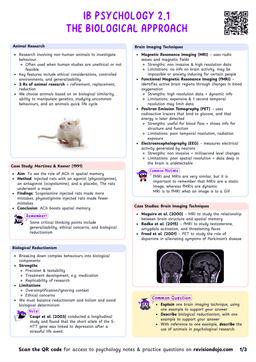Biological Reductionism
Biological Reductionism
Biological reductionism is a core concept in biological psychology that involves breaking down complex behaviors into simpler biological components, such as neurotransmitters, brain structures, or genes.
Think of biological reductionism like trying to understand a car by examining its engine. While the engine is crucial, it doesn't explain everything about how the car operates.
Strengths of Biological Reductionism
Precision and Testability
- By focusing on specific biological factors, researchers can design experiments that are precise and testable.
- This allows for clear hypotheses and measurable outcomes.
For example, studies on serotonin levels in depression can use placebo-controlled trials to test the effects of SSRIs.
Treatment Development
- Biological reductionism has led to the development of effective treatments, such as medications for mental disorders.
- These treatments often target specific biological mechanisms.
SSRIs for depression work by increasing serotonin levels in the brain.
Antipsychotic drugs for schizophrenia target dopamine receptors.
Replicability
- Biological studies often use standardized methods, making them easier to replicate.
- This enhances the reliability of findings.
Brain imaging studies, such as fMRI, use consistent protocols that can be replicated across different labs.
Limitations of Biological Reductionism
Oversimplification
- Biological reductionism can oversimplify complex behaviors by ignoring other factors, such as environmental or psychological influences.
- This can lead to incomplete explanations.
Explaining depression solely through serotonin levels ignores the role of life events or cognitive patterns.
Ignoring Context
- By focusing on individual components, biological reductionism often neglects the interactions between different factors, such as context.
- This can limit our understanding of how behaviors emerge.
The diathesis-stress model of disorders highlights the interaction between genetic vulnerability and environmental stressors.
Ethical Concerns
- Biological reductionism can lead to ethical issues, such as determinism or stigmatization.
- It may imply that individuals have no control over their behavior.
Labeling someone as "genetically predisposed" to a disorder can lead to discrimination.
Drug treatments may be seen as a "quick fix," ignoring the importance of therapy or lifestyle changes.
Critical Thinking
Balancing Reductionism and Holism
- While biological reductionism offers precision , it should be balanced with holistic approaches that consider the whole person.
- This integration can lead to more comprehensive explanations.
Combining biological and cognitive approaches in treating depression can address both neurochemical and thought patterns.
Biopsychosocial models integrate biological , psychological , and social factors.
Avoiding Determinism
- It's important to avoid the deterministic view that biology alone dictates behavior.
- Free will and personal agency also play a role. Biological Reductionism calls free will into question.
Ethical Implications
- Researchers should consider the ethical implications of biological reductionism, especially in areas like genetic testing or drug treatments.
- Ensuring informed consent and avoiding harm is crucial.
Genetic counseling should provide balanced information to avoid anxiety or misunderstandings.
Key Study
Caspi et al. (2003)
Aim: To investigate the role of the 5-HTT gene in depression.
Method: Longitudinal study with 847 participants.
Findings: Individuals with the short allele of the 5-HTT gene were more likely to develop depression after stressful life events.
Conclusion: The study supports the idea that genetic factors interact with environmental stressors.
Critical Thinking Questions
- How can biological reductionism be integrated with other approaches to provide a more comprehensive understanding of behavior?
- What are the ethical implications of focusing solely on biological explanations for mental disorders?
- How does the concept of neuroplasticity challenge traditional views of biological reductionism?


